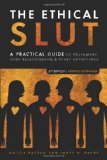I am leading a read-through of The Ethical Slut, 2nd edition. If you’d like to catch up on past installments, check the list at the bottom of the series introduction. Comments on the topics in this discussion are welcome anytime, even from people who aren’t following along in the book.
In this installment we conclude our discussion of CHAPTER 8, “Slut Skills,” which began earlier this week.

Welcome back to our discussion of ten essential slut skills outlined in Chapter 8 of The Ethical Slut. In the last installment we examined the skills of communication, emotional honesty, telling the truth, knowing yourself and affection. Today we’re going to continue with the remaining five skills, one by one.
Planning: I like my life to have a fair amount of spontaneity in it. I don’t want to schedule every minute of my time or have an extremely rigid rotation of partners (a la Big Love for a non-poly example). At the same time, I’ve recognized the necessity for planning. It’s easy to drop in on my lover Honey J, who lives here in Austin (and in fact is in the process of moving into easy cycling distance from my house), so while we do try to get together on a regular basis there can be a lot of flexibility. Compare that with my pet, who lives in Houston for the moment. I make sure to record her days off in my calendar and we try to plan in advance so we can make it to play parties or other events we might enjoy. Even with my local lovers there are many situations where it makes sense to keep track.
Easton & Hardy talk about poly groups that use “complex online calendars” to share their schedules, and I think they are partly right — online calendars are great. However, I think a solution like Google Calendar is anything but difficult to use to keep track of my appointments, dates, and lots of work related scheduling. It’s a piece of cake to share my calendar with my friends or loved ones, and it plays nice with Androids and most other smartphones as well as Facebook’s events calendar. Here in Austin there’s even a calendar of kink events you can add.
Faithulness:
“Faithfulness is about honoring your commitments and respecting your friends and lovers, about caring for their well-being as well as your own.” -from The Ethical Slut
Faithfulness as Hardy & Easton define it is not about who or how many people you have sex with, but about something we’ve discussed elsewhere in this series — making sure everyone you are involved with feels special. Faithfulness is making sure you’ll know that if a person makes a date with you they are going to keep it and not develop a pattern of always letting circumstances get in the way. It means being open about your polyamory — letting people know early and up front the kinds of relationships you choose to have, and about those you might be in already. “We figure any cutie put off by meeting our spouses will likely make trouble in the future,” note the authors. It’s also about making sure everyone has similar expectations — if I go to a play party with one or more of my lovers, it’s important to understand the possibilities, desires and expectations of everyone involved; I make sure it’s clear, if it needs to be, who I am going home with at the end of the party and other similar issues.
Limit-Setting: Limits are important in any relationship and for any person. In the last year I discovered that one of my limits is that I am uncomfortable if one of my lovers is dating someone who acts actively hostile toward me. I thought I could accommodate the idea that we all just need to know about each other but don’t all need to get along, but it turns out that’s not true for my comfort levels.
“To be a happy slut,” note the authors of the book, “you need to know how — and when — to say no.” We’ve already discussed how some subcultures handle boundary-setting and ‘no’ in constructive, sex positive ways. In writing this entry I was reminded of this wonderful document created years ago for Burning Flipside which is not only a fantastic essay on the importance of setting boundaries but also a mini-tutorial on how to enforce them.
Somehow the idea that actively obtaining consent is unsexy has permeated our culture. I find this strange because sometimes it can be wonderfully erotic — there’s very little hotter than growling in a lover’s ear, “Do you want me to <action> your <body part> now?” and hearing them moan out a desperate “Yes!” I think people imagine it to be mechanical, not an adaptable and lively part of a healthy sexual transaction. I very much enjoyed the recent post Roadmaps of Consent,” from the blog Adventures in Pleasure; it provides a series of great examples of how easy the process can be, and how it adapts in ongoing, kinky relationships.

Owning Your Feelings: This one is so important. Blaming others for how we feel is rarely productive. No matter what we feel — how angry, sad, jealous, lustful, or overwhelmed by any of a dozen other extreme emotions — we have a decision how to react to them. This skill is an absolute-must have for me in a relationship. I would rather hear about any negative reaction, or share one with my partners, than to have it bottled up and turn into resentment. This skill leads directly into the next one.
Going Easy on Yourself: Just as we’ve touched on having forgiveness for others in your life when they make mistakes, it’s important to have forgiveness and compassion for yourself. As we said in the last part, we can’t all be poly superheroes. Despite our best desires, we may find barriers, issues, and triggers we didn’t anticipate or have trouble dealing with. For some people, this may even mean taking a step back from open relationships or relationships at all for a while, but remember if you have to do take those steps it shouldn’t be a judgment on yourself, just part of the road to happiness in what will hopefully be a long and pleasurable life.
This chapter ends with an exercise encouraging you to discover personal affirmations which will make you feel better in difficult times. Honestly, I’ve never made a regular use of an affirmation, but I did have a dear friend who did. When we would go to parties together, at the end of the night she would remind herself with an affirmation that she’d had a good time and enjoyed herself, and those were good things which should not cause guilt. Over time, repeating this affirmation helped her overcome her lingering Catholic guilt. For other people it can be more helpful to write things down; last night my Pet told me that for a while she wrote down 3 positive things that happened every day and over time this improved her attitude and self-esteem.
I’ll write about Chapter 9, “Boundaries” on Thursday, February 24. Till then let’s talk about what slut skills you have learned that have helped you in your relationships. What skills have you struggled with? Are there affirmations you use which help you feel good about what you do?
